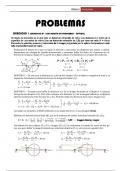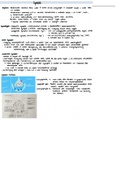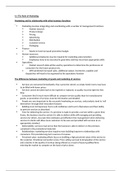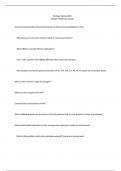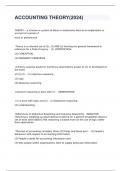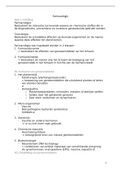CHAPTER 1: WHY STUDY FINANCIAL MARKETS AND INSTITUTIONS
● Stock Market: market where common or just normal stocks are traded. First, in the primary market but
afterwards investors trade the stocks among them
○ Stock market values went up a lot in the last years
○ Aggregation of buyers and sellers of stocks, which represent ownership claims on businesses.
○
● FOREX: where international currencies trade and exchange rates are set
● Interest rate = cost of borrowing
● Corporate bonds = highest yield
● Why buy gov bills with YTM < 0 ? The lower the yield on a bond, the higher its price
● Better than holding cash, it is as if the gov guard your money in a vault
CHAPTER 2:OVERVIEW OF THE FINANCIAL SYSTEM
● FUNCTION OF FINANCIAL MARKETS
○ lender/savers --- person or business without investment opportunities
○ borrower/spenders --- one who has investment opportunity
○ FINANCIAL MARKETS CLASSIFICATION
○ Segments
○ Direct finance: Borrowers borrow directly from lenders in financial markets by selling financial
instruments (Bigger return, bigger risk)
○ Indirect Finance: Borrowers borrow indirectly from lenders via financial intermediaries (Banks =
intermed. Less return but less risk. Bank rarely go bankrupt)
○ Structure
○ Debt Markets -- bonds (much bigger)
■ Borrowers issue a security (=bond) offering interest and principal over time
■ Short-Term (maturity < 1 year)
■ Long-Term (maturity > 10 year)
■ Intermediate term (maturity in-between)
■ Around $300 trillion globally at Q2 2021.
○ Equity Markets -- stocks
■ Pay dividends, in theory forever
■ Represents an ownership claim in the firm
■ Around $140 trillion globally in 2021
○ Classification
○ Money Market
■ Short-Term (maturity < 1 year)
○ Capital Market:
■ Long-Term (maturity > 1 year) plus equities (no maturity)
○ Primary vs Secondary
○ Primary Market
■ New security issues sold to initial buyers
■ Typically involves an investment bank who underwrites the offering
■ Soft underwriting : bank helps find and sell whatever they can (commission)
■ Hard underwriting :If bank doesn’t find, they’ll buy it
themselves.
■ IPO
○ Secondary Market
■ Securities previously issued are bought and sold
, ■ Examples include the NYSE and Nasdaq
■ Involves both brokers and dealers.
■ Broker is a person who executes the trade on behalf of others
■ Dealer is a person who trades business on their own behalf
■ Secondary Equity Offerings (SEOs) : sale of new or closely held shares by a
company that has already made an initial public offering (IPO). Its success is dependent
on the company’s stock.
○ Market maker : takes position, make prices all the time. Creates liquidity
○ Property trader : is speculating, deliberately buys & sells instruments.
● IMPORTANCE OF FINANCIAL MARKETS
○ Financial Markets help us to get return out of our money
○ Critical for producing an efficient allocation of capital, allowing funds to move from people who
lack productive investment opportunities to people who have them.
○ Improve the well-being of consumers, allowing them to time their purchases better
■ ex. if a young people wants to buy a house they can get a mortgage and they do not
have to wait
● the secondary market, it serves two important functions:
○ Provides liquidity, making it easy to buy and sell the securities of the companies
○ Establishes a price for the securities (useful for company valuation)
● classify secondary markets
○ Exchanges
■ Trades conducted in central locations (e.g., New York Stock Exchange, CBT, Corporate
and Banking technology)
○ Over-the-Counter Markets
■ Dealers at different locations buy and sell
■ Best example is the market for Treasury Securities
● Internationalization of Financial Markets
○ Foreign bonds
■ Denominated in a foreign currency
■ Targeted at a foreign market
○ Eurobonds
■ international bonds issued in a currency other than that of the issuer. Despite of their name, its
currency does not have to be euros
■ Denominated in one currency, but sold in a different market
■ Now larger than U.S. corporate bond market
■ Over 80% of new bonds are Eurobonds
■ (Now larger > US Corp. Bond M)
, BEL 20: index for belgian companies
● Eurocurrency Market
○ Foreign currency deposited outside of home country
○ Eurodollars are U.S. dollars deposited in London.
○ Gives U.S. borrowers an alternative source for dollars.
● WHY HAS THE US LOST DOMINANCE
○ New technology in foreign exchanges
○ 9-11 made U.S. regulations tighter
○ Greater risk of lawsuit in the U.S.
○ Sarbanes-Oxley has increased the cost of being a U.S.-listed public company
● Function of Financial Intermediaries: Indirect Finance
○ a financial intermediary (such as a bank) plays as the middleman:
■ the intermediary obtains funds from savers
■ the intermediary then makes loans/investments with borrowers
■ more important source of financing than securities markets)
○ financial intermediaries, not only banks, they don't keep the money without using
● A financial intermediary’s low transaction costs mean that it can provide its customers with liquidity
services, services that make it easier for customers to conduct transactions
○ Banks provide depositors with checking accounts that enable them to pay their bills easily
○ Depositors can earn interest on checking and savings accounts and yet still convert them into goods
and services whenever necessary
● Risk sharing
○ asset transformation: financial intermediaries create and sell assets with lesser risk to one party in
order to buy assets with greater risk from another party
○ in a sense risky assets are turned into safer assets for investors
● Diversifying
● Reduce asymmetric information:
○ One party lacks crucial information about another party, impacting decision-making
○ investors may be subject to adverse selection and moral hazard problems that may hinder the
efficient operation of financial markets and may also keep investors away from financial
markets.
○ two fronts:
■ Adverse Selection
● Before transaction occurs
● Potential borrowers most likely to produce adverse outcome are ones most likely
to seek a loan
● Similar problems occur with insurance where unhealthy people want their known
medical problems covered
■ Moral Hazard
● After transaction occurs
● Hazard that borrower has incentives to engage in undesirable (immoral)
activities making it more likely that won’t pay loan back
● Stock Market: market where common or just normal stocks are traded. First, in the primary market but
afterwards investors trade the stocks among them
○ Stock market values went up a lot in the last years
○ Aggregation of buyers and sellers of stocks, which represent ownership claims on businesses.
○
● FOREX: where international currencies trade and exchange rates are set
● Interest rate = cost of borrowing
● Corporate bonds = highest yield
● Why buy gov bills with YTM < 0 ? The lower the yield on a bond, the higher its price
● Better than holding cash, it is as if the gov guard your money in a vault
CHAPTER 2:OVERVIEW OF THE FINANCIAL SYSTEM
● FUNCTION OF FINANCIAL MARKETS
○ lender/savers --- person or business without investment opportunities
○ borrower/spenders --- one who has investment opportunity
○ FINANCIAL MARKETS CLASSIFICATION
○ Segments
○ Direct finance: Borrowers borrow directly from lenders in financial markets by selling financial
instruments (Bigger return, bigger risk)
○ Indirect Finance: Borrowers borrow indirectly from lenders via financial intermediaries (Banks =
intermed. Less return but less risk. Bank rarely go bankrupt)
○ Structure
○ Debt Markets -- bonds (much bigger)
■ Borrowers issue a security (=bond) offering interest and principal over time
■ Short-Term (maturity < 1 year)
■ Long-Term (maturity > 10 year)
■ Intermediate term (maturity in-between)
■ Around $300 trillion globally at Q2 2021.
○ Equity Markets -- stocks
■ Pay dividends, in theory forever
■ Represents an ownership claim in the firm
■ Around $140 trillion globally in 2021
○ Classification
○ Money Market
■ Short-Term (maturity < 1 year)
○ Capital Market:
■ Long-Term (maturity > 1 year) plus equities (no maturity)
○ Primary vs Secondary
○ Primary Market
■ New security issues sold to initial buyers
■ Typically involves an investment bank who underwrites the offering
■ Soft underwriting : bank helps find and sell whatever they can (commission)
■ Hard underwriting :If bank doesn’t find, they’ll buy it
themselves.
■ IPO
○ Secondary Market
■ Securities previously issued are bought and sold
, ■ Examples include the NYSE and Nasdaq
■ Involves both brokers and dealers.
■ Broker is a person who executes the trade on behalf of others
■ Dealer is a person who trades business on their own behalf
■ Secondary Equity Offerings (SEOs) : sale of new or closely held shares by a
company that has already made an initial public offering (IPO). Its success is dependent
on the company’s stock.
○ Market maker : takes position, make prices all the time. Creates liquidity
○ Property trader : is speculating, deliberately buys & sells instruments.
● IMPORTANCE OF FINANCIAL MARKETS
○ Financial Markets help us to get return out of our money
○ Critical for producing an efficient allocation of capital, allowing funds to move from people who
lack productive investment opportunities to people who have them.
○ Improve the well-being of consumers, allowing them to time their purchases better
■ ex. if a young people wants to buy a house they can get a mortgage and they do not
have to wait
● the secondary market, it serves two important functions:
○ Provides liquidity, making it easy to buy and sell the securities of the companies
○ Establishes a price for the securities (useful for company valuation)
● classify secondary markets
○ Exchanges
■ Trades conducted in central locations (e.g., New York Stock Exchange, CBT, Corporate
and Banking technology)
○ Over-the-Counter Markets
■ Dealers at different locations buy and sell
■ Best example is the market for Treasury Securities
● Internationalization of Financial Markets
○ Foreign bonds
■ Denominated in a foreign currency
■ Targeted at a foreign market
○ Eurobonds
■ international bonds issued in a currency other than that of the issuer. Despite of their name, its
currency does not have to be euros
■ Denominated in one currency, but sold in a different market
■ Now larger than U.S. corporate bond market
■ Over 80% of new bonds are Eurobonds
■ (Now larger > US Corp. Bond M)
, BEL 20: index for belgian companies
● Eurocurrency Market
○ Foreign currency deposited outside of home country
○ Eurodollars are U.S. dollars deposited in London.
○ Gives U.S. borrowers an alternative source for dollars.
● WHY HAS THE US LOST DOMINANCE
○ New technology in foreign exchanges
○ 9-11 made U.S. regulations tighter
○ Greater risk of lawsuit in the U.S.
○ Sarbanes-Oxley has increased the cost of being a U.S.-listed public company
● Function of Financial Intermediaries: Indirect Finance
○ a financial intermediary (such as a bank) plays as the middleman:
■ the intermediary obtains funds from savers
■ the intermediary then makes loans/investments with borrowers
■ more important source of financing than securities markets)
○ financial intermediaries, not only banks, they don't keep the money without using
● A financial intermediary’s low transaction costs mean that it can provide its customers with liquidity
services, services that make it easier for customers to conduct transactions
○ Banks provide depositors with checking accounts that enable them to pay their bills easily
○ Depositors can earn interest on checking and savings accounts and yet still convert them into goods
and services whenever necessary
● Risk sharing
○ asset transformation: financial intermediaries create and sell assets with lesser risk to one party in
order to buy assets with greater risk from another party
○ in a sense risky assets are turned into safer assets for investors
● Diversifying
● Reduce asymmetric information:
○ One party lacks crucial information about another party, impacting decision-making
○ investors may be subject to adverse selection and moral hazard problems that may hinder the
efficient operation of financial markets and may also keep investors away from financial
markets.
○ two fronts:
■ Adverse Selection
● Before transaction occurs
● Potential borrowers most likely to produce adverse outcome are ones most likely
to seek a loan
● Similar problems occur with insurance where unhealthy people want their known
medical problems covered
■ Moral Hazard
● After transaction occurs
● Hazard that borrower has incentives to engage in undesirable (immoral)
activities making it more likely that won’t pay loan back



